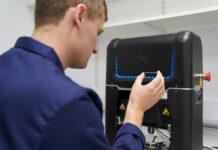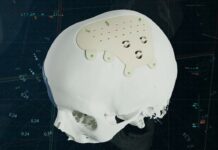Systemic Bio’s efforts will be supported by an initial $15 million seed investment from 3D Systems, which, given the maturity of the underlying materials and process technology, is envisioned to support them through the start-up phase, bridging them to a material revenue level and profitability. Systemic Bio intends to open an exciting new growth market for 3D Systems in the pharmaceutical arena, creating a biotech revenue stream for the company that could approach $100 million annually over the next five years.
After extending its expertise in the 3D bioprinting space – through acquisitions, experiences and partnerships, Additive Manufacturing giant 3D Systems creates a wholly owned company called Systemic Bio™. The biotech startup focuses on the application of advanced bioprinting technologies to pharmaceutical drug discovery and development.
Systemic Bio™ will leverage 3D Systems’ breakthrough, production-level bioprinting technology to create extremely precise vascularized organ models using biomaterials and human cells. These proprietary organs-on-chips can be manufactured reproducibly in large quantities, and then perfused with any desired drug compound to study drug metabolism and the effects on healthy or diseased tissue at the earliest stages of new pharmaceutical drug development. The ability to accurately simulate human response to an experimental drug in the laboratory, early in the development process, offers the potential to significantly reduce both the high costs and extended times required for pharmaceutical companies to bring a new drug to market. In addition, this approach could eventually reduce or even eliminate the need for animal testing as a precursor to full-scale human trials for new drug development.
From Allevi to Systemic Bio™
In addition to the aforementioned funding, the new startup will be led by Taci Pereira, who served as Chief Scientific Officer of Allevi. After the company’s acquisition, she became Vice President and General Manager of Bioprinting for 3D Systems.
“As the leader of our Allevi business, Taci brought a unique blend of business acumen and bioprinting expertise that has enabled our continued growth in laboratory solutions,” said Menno Ellis, executive vice president, healthcare solutions, 3D Systems. “Her knowledge, passion, and demonstrated leadership position Taci very well for her new role as CEO of Systemic Bio. I’m confident that the solutions her team delivers can have a transformative impact in the field of pharmaceutical drug discovery and contribute meaningfully to the exciting growth we have envisioned for our healthcare business.”
This announcement follows the recent development of a 3D printed human lung scaffold, a milestone achieved in collaboration with United Therapeutics. Systemic Bio™ will leverage these innovative bioprinting solutions in combination with 3D Systems’ Print to Perfusion™ process to bioprint highly complex, custom-designed, vascularized tissues for its proprietary organ-on-a-chip platform, called h-VIOS™.
The h-VIOS™ (human vascularized integrated organ systems) organ-on-a-chip platform comprises plates of cellularized or acellular vascularized three-dimensional scaffolds, and accompanying accessories needed for drug testing. Unlike other currently available models which are created from synthetic materials such as silicone, h-VIOS™ uses hydrogels that much more closely resemble human tissues. The combination of these hydrogels with 3D Systems’ Print to Perfusion process for cellularization, enables 3D printing of high-resolution scaffolds that very closely mimic human tissues. A critical differentiator of this technology over competing historical tissue engineering approaches is the precision of the printing process with these unique hydrogel materials. These bioprinted scaffolds can be seeded with human cells from different organs, including both healthy and diseased, creating tissues to screen drug candidates for safety and efficacy. This human-based, physiologically relevant platform has the potential to change the way new drug therapies are developed.
Systemic Bio™ produces these customized chips on its bioprinters at its facility in Houston, Texas. These bioprinters are capable of at least 10x greater build volume and up to 10X higher resolution than other available platforms which enables efficient, production-grade manufacturing. Systemic Bio™is now working to establish multi-phase partnerships with pharmaceutical companies that could lead to the discovery of promising new drugs. Beyond providing organ-on-a-chip test samples, pharmaceutical companies may also seek to retain Systemic Bio™ to provide contract research services in addition to procuring custom-designed h-VIOS to perform their own research and testing.
Remember, you can post job opportunities in the AM Industry on 3D ADEPT Media free of charge or look for a job via our job board. Make sure to follow us on our social networks and subscribe to our weekly newsletter : Facebook, Twitter, LinkedIn & Instagram ! If you want to be featured in the next issue of our digital magazine or if you hear a story that needs to be heard, make sure you send it to contact@3dadept.com.






